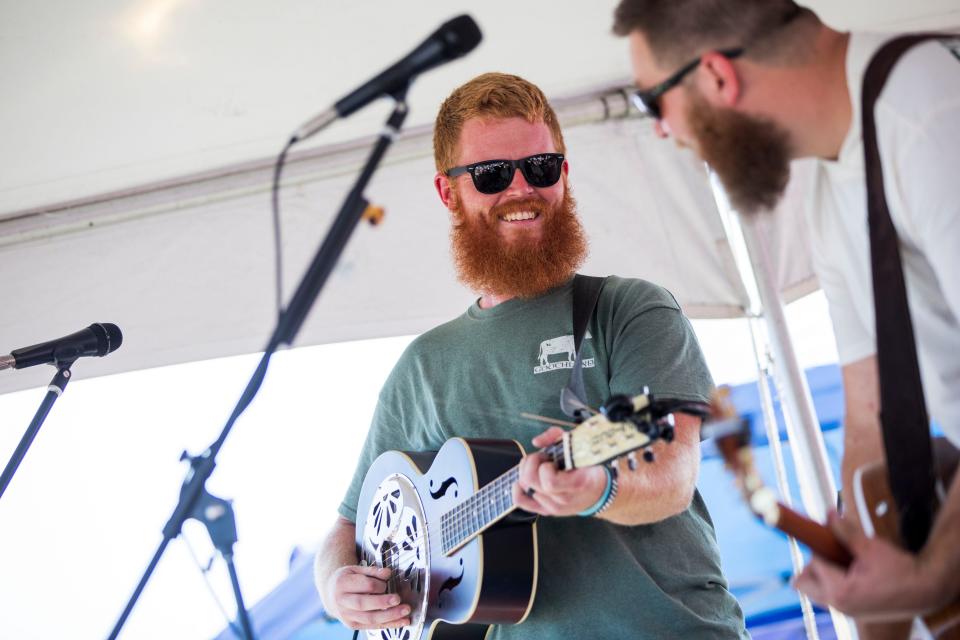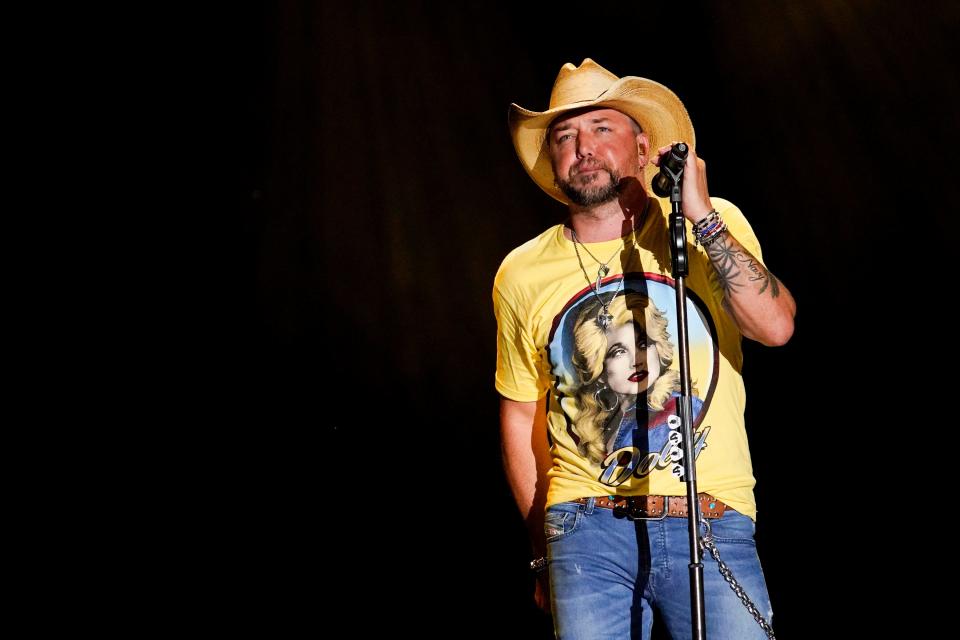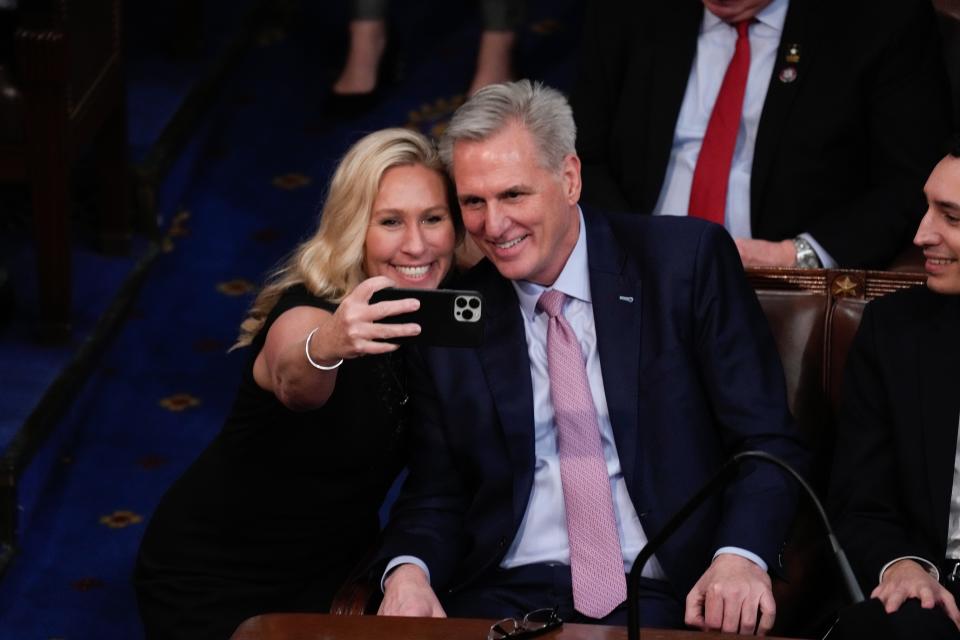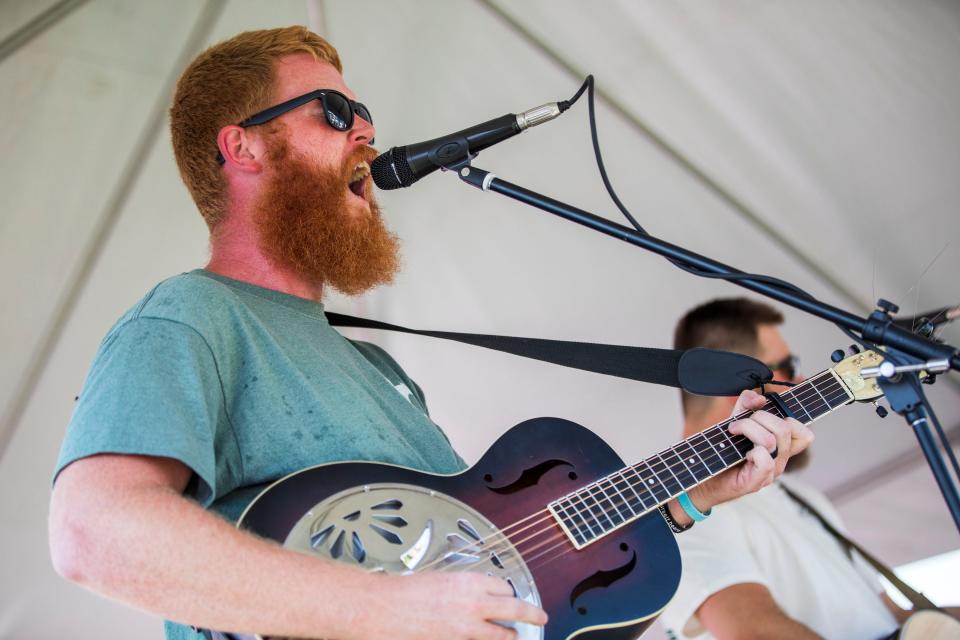'Rich Men North of Richmond,' 'Sound of Freedom' and the conservative pop culture moment
- Oops!Something went wrong.Please try again later.
- Oops!Something went wrong.Please try again later.
- Oops!Something went wrong.Please try again later.
To call the viral country song “Rich Men North of Richmond” a surprise hit with millions of fans is to court extreme understatement.
Consider it more a lightning rod that just channeled a billion volts of cultural electricity.
Released Aug. 8 on YouTube, Oliver Anthony’s raw and controversial paean to the working class quickly caught fire with listeners as well as conservative politicians and pundits.
That spotlight helped land the song at the top spot on the Billboard Hot 100 chart, a virtually unheard feat for a totally unknown and unsigned artist. "Rich Men" then stunningly became the lead-off topic at the recent Republican presidential debate. It retained its No. 1 position for a second week and currently has 30 million listens on Spotify and 46 million views on YouTube. Within its first week of release, it sold nearly 150,000 digital downloads, according to entertainment data company Luminate.
But far more significant than those numbers is the way in which "Rich Men" has become another highly visible salvo in the nation’s roiling culture wars – even if its unwitting creator didn't intend it as such.

Its success – akin to the surprise box office haul of “Sound of Freedom” and coordinated attempts to restrict access to certain books – speaks directly to ways in which conservative voices are no longer willing to cede the cultural high ground as the nation hurtles towards another election.
“There’s absolutely been more of a concerted effort in the conservative world to push into pop culture as one of their big battlegrounds," says Joel Penney, associate professor at Montclair State University and author of “Pop Culture, Politics and the News: Entertainment Journalism in the Polarized Media Landscape.”
Late conservative blogger Andrew Breitbart "had a saying, ‘Politics is downstream from culture,’ ” Penney says. "Conservatives see pop culture as something they have to engage with and not just rage at. Having success in pop culture paves the way for political success.”
Lately, country songs, many with conservative overtones, have been making a strong showing on the charts. Those tunes include Jason Aldean’s “Try That in a Small Town,” a Billboard chart-topper in July that quickly was condemned in some circles as being anti-Black and pro-lynching, accusations Aldean decried as “meritless but dangerous.”
But nothing has detonated quite like “Rich Men,” which within weeks of its release captured the cultural spotlight so completely that a portion of the song was played at the start of the Republican debates last week as a lead-in to a question about why it was having such a moment.
Candidates danced around the question, but don’t be surprised if they circle back to it if needed, says Eric T. Kasper, a professor of political science at University of Wisconsin–Eau Claire and co-author of “You Shook Me All Campaign Long: Music in the 2016 Presidential Election and Beyond."

“By referring to popular songs, movies, television programs, books, etc., politicians can link themselves to elements of popular culture and seize upon their popularity,” says Kasper, noting the same has been done over the years with songs such as Bruce Springsteen’s “Born in the U.S.A.” and Woody Guthrie's "This Land Is Your Land."
“It can be a way to positively connect with voters, and it may help bring that politician to a voter’s mind the next time the voter hears the song, watches the movie, and so on,” he says.
People with no connection to 'Rich Men' are responsible for its sky-rocketing success
How did “Rich Men” get so hot so fast? Cultural observers note that the song’s rapid rise did not come from an orchestrated campaign but rather a series of unconnected and overlapping actions.
Whereas producers of “Sound of Freedom,” a hit movie that focused on the true story of a federal agent who saves Latin American children from traffickers, asked for fan support with both marketing dollars and ticket sales, “Rich Men” and creator Anthony had no such machine behind them.
Instead, once it started racking up views on YouTube, politicians such as Marjorie Taylor Greene (who called it “the anthem of the forgotten Americans”), pundits such as Matt Walsh and fellow musicians including John Rich quickly alerted their fan bases to the tune, starting multiple snowballs rolling at once.

“Taylor Swift and K-pop fans long ago learned how to get behind those records and move them up the charts, and conservatives have figured that out too now,” says Brian Mansfield, managing editor of radio trade newsletter Country Insider and a former USA TODAY music critic.
Mansfield says today’s influencers are capable of in turn activating sprawling and overlapping networks of fans, “but it’s all very decentralized as opposed to some Facebook page that everyone is taking orders from,” he says. “Ultimately, though, the piece of art has to genuinely resonate with large groups of people. That’s when you get to a tipping point, which is what happened here.”
That’s particularly helpful with a country song that courts controversy, given that radio stations tend to steer clear of anything that might drive away some listeners, says R.J. Curtis, executive director of Country Radio Broadcasters, a nonprofit service organization.
“The radio programmer mantra is ‘when in doubt, leave it out,’ ” says Curtis, adding that the political nature of “Rich Men” means DJs can’t just play the song in a rotation but instead have to set the song up in context. Whether some bother to do that depends partly on the groundswell around the song.
“Everyone seems more sensitive to things these days,” he says. “But if something comes into the mainstream and is being consumed, (country radio) will likely have to address it accordingly.”
It may not hurt that some top country stars have been quick to show their enthusiastic support of “Rich Men.”
"When a guy like myself or Jason or Oliver Anthony – our new buddy who's coming out here now – when guys like us speak the truth in a song, it's done that way on purpose," John Rich told Fox News Digital.
Yet recent commercial and pop culture success doesn't "point to some grand conservative takeover of pop culture," Penney says. "It’s just that they’re having some more inroads into this world, which they had previously been cut out from. The biggest pop-culture story of this summer was the ‘Barbie’ movie, and everybody’s talking about that as something that has a very left-wing point of view, and that made a billion dollars.
"So it’s not like the entertainment industry is totally changing its character," he continues. "But when these success stories do pop up, a lot of them are promoted by conservative pundits who are invested in their success. They try to highlight those examples to tell a larger story – one that, in reality, is probably a lot more complex.”
Oliver Anthony's response underscores political scheme: 'I wrote that song about those people'
Among those most surprised at the explosive reaction to “Rich Men” is likely Anthony, a one-time factory worker whose real name is Christopher Anthony Lunsford. The red-bearded troubadour lives on a farm in rural Virginia. None of his previous songs had struck cultural pay dirt, and this new tune seems largely a lyrical exercise in genuine frustration.
The song includes many references to the hardships of being poor and not seeing possibilities for economic growth, including the lines: "I’ve been selling my soul/Working all-day/Overtime hours, bulls--- pay/So I can sit out here/And waste my life away.”
But “Rich Men” also has lines that have sparked charges of being anti-poor, namely because of lyrics that target people on welfare. “Lord, we got folks in the street, ain’t got nothin’ to eat/And the obese milkin’ welfare,” Anthony sings. “Well, God, if you’re 5-foot-3 and you’re 300 pounds/Taxes ought not to pay for your bags of Fudge Rounds.”
Anthony responded personally to both liberal attacks and conservative hugs in a teary 10-minute YouTube video last week in which he made clear his distaste for being a political punching bag.
“It’s aggravating seeing people on the conservative news try to identify with me, like I’m one of them,” he said. “It’s aggravating seeing certain musicians and politicians act like we’re buddies and act like we’re fighting the same struggle, like we’re trying to present the same message.”

Anthony reiterated that he was politically centrist, hated that the song was being “weaponized,” and despite rumored offers of recording contracts and tours, wasn’t sure what was next.
USA TODAY reached out to Anthony for comment.
If there is an irony to the story of “Rich Men North of Richmond,” it is that the messenger is proving to be an inconvenient thorn in the side of an irresistible message.
"It was funny seeing my song ... at the presidential debate," Anthony said in the video he made following the song’s boom. "Because I wrote that song about those people."
This article originally appeared on USA TODAY: 'Rich Men North of Richmond' spells big conservative pop culture win

